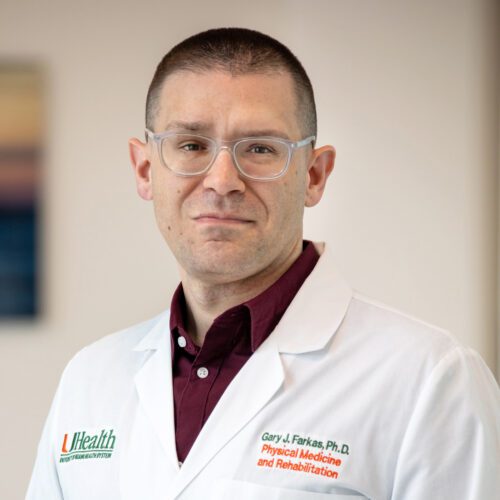Gary J. Farkas, Ph.D., MSCTI
Assistant Professor, Department of Physical Medicine and Rehabilitation

The Miami Project to Cure Paralysis
Christine E. Lynn Rehabilitation Center
1611 NW 12th Ave, Room 3.161
Miami, FL 33136
Biography
Research Interests
Areas Of Research
Publications
More
Dr. Farkas received his bachelor’s degree in kinesiology from the University of Illinois at Chicago, a master’s degree in clinical and translational investigation from the University of Miami Miller School of Medicine, and a doctor of physiology in anatomy from the Pennsylvania State University College of Medicine. He spent his final years training as a postdoctoral fellow at the University of Miami Miller School of Medicine / The Miami Project to Cure Paralysis.
Dr. Farkas is an assistant professor of Physical Medicine and Rehabilitation, with a secondary appointment in The Miami Project to Cure Paralysis. He is the Principal Investigator and Director of the Appetite and Energy Metabolism (AEM) laboratory. His funded research centers around neurogenic obesity following spinal cord injury, delving into the interplay of factors influencing energy metabolism, appetite regulation, and eating behavior. Dr. Farkas is an award-winning researcher recognized by numerous local and national organizations. He has authored over 50 peer-reviewed papers and book chapters and presented his findings at national and international conferences.
Neurogenic Obesity, Energy Metabolism, and Appetite in Spinal Cord Injury
Dr. Farkas’s research is dedicated to understanding and addressing neurogenic obesity, diet/nutrition, appetite, eating behavior and their association with cardiovascular complications in individuals with spinal cord injury (SCI). He investigates the underlying neurobiobehavioral mechanisms contributing to obesity and food intake after SCI and develops and tests interventions to improve the management of these conditions and overall health outcomes. His laboratory employs a multidisciplinary approach encompassing physiological, behavioral, and neurological techniques to test hypotheses. His research aims to translate findings into effective prevention and treatment strategies that enhance the quality of life for individuals with SCI while also reducing cardiovascular risk.
PROFESSIONAL AFFILIATIONS/MEMBERSHIPS
- Member, Academy of Spinal Cord Injury Professionals, 2015-present
- Member, American Spinal Injury Association, 2020-present
- Member, The Obesity Society, 2023-present
- Member, International Spinal Cord Society, 2024-present
- Member, Society for the Study of Ingestive Behavior, 2024-present
- Editorial Board, Topics in Spinal Cord Injury Rehabilitation, 2024-present
- Reviewer Board, Journal of Clinical Medicine, 2021-present
- Editorial Board, Sports Science, Medicine and Rehabilitation, 2024-present
